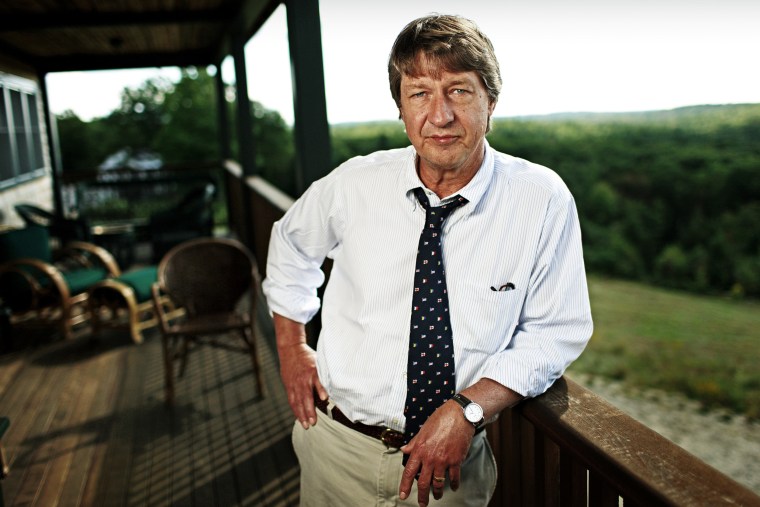P.J. O'Rourke, an influential baby boomer satirist and commentator who defied the counterculture's leftward politics, died Tuesday morning. He was 74.
Deb Seager, a vice president and spokeswoman at his publisher, Grove Atlantic, confirmed O'Rourke's death in a statement.
"Our dear friend and cherished Grove Atlantic author P. J. O’Rourke passed away this morning from complications of lung cancer," she said.
She noted his accomplishments: "A journalist and political satirist, O’Rourke wrote over 20 books on subjects as diverse as politics, cars, etiquette, and economics, including his two No. 1 New York Times Bestsellers, 'Parliament of Whores' and 'Give War a Chance.'"
Morgan Entrekin, the CEO and publisher of Grove Atlantic, said, “P.J. was one of the major voices of his generation.”
O'Rourke, educated at Miami University in his home state, Ohio, and as a Woodrow Wilson Fellow at Johns Hopkins University in Maryland, worked at small newspapers in Baltimore and New York before he became known for his work as editor-in-chief of the National Lampoon in the 1970s.
He emerged as a counterculture-wary hell-raiser inspired by gonzo journalist Hunter S. Thompson, whom he called a friend and "the best writer of the late 20th century."
"I came to Hunter fairly late," he said in an oral history of Thompson. Tom "Wolfe was the first of the New Journalists that I read, and it was 'The Electric Kool-Aid Acid Test.' I admired it enormously for its writing, but actually being a hippie, I considered it fairly inaccurate. ... I didn't become a Hunter fan until some time in the late '70s."
O'Rourke was a known drinker, and he was widely quoted as saying: "No drug, not even alcohol, causes the fundamental ills of society. If we’re looking for the source of our troubles, we shouldn’t test people for drugs, we should test them for stupidity."
He would go on to work for Rolling Stone and The Atlantic Monthly before contributing to the pages of Automobile Magazine, Esquire, Vanity Fair, Car and Driver, the Daily Beast and The Weekly Standard.
O’Rourke worked at times in Hollywood, having written the script for Rodney Dangerfield’s “Easy Money" and appearing as himself on the HBO series "True Blood."
In his 1991 book, "Parliament of Whores," O'Rourke detailed his disdain for modern politics: "The Democrats are the party that says government will make you smarter, taller, richer, and remove the crabgrass on your lawn. Republicans are the party that says government doesn't work, and then they get elected and prove it."
He said he considered himself to be a libertarian, and his work often defied the leftward tilt of his generation, reflecting the growing conservatism of some aging baby boomers.
He was skeptical of the presidency of Barack Obama, dismissing it as "the Carter administration in better sweaters," and he sympathized with the anti-government tea party movement of the early 2010s.
"Fiscal conservatism is just an easy way to express something that is a bit more difficult, which is that the size and scope of government, and really the size and scope of politics in our lives, has grown uncomfortable, unwieldy, intrusive and inefficient," he told The Guardian.
In the 2010 interview, The Guardian called him “the rightwinger it’s OK for lefties to like,” but O'Rourke characteristically refused easy categorization and would go on to be a critic of President Donald Trump.
He announced in 2016 that he would support Hillary Clinton and called Trump "unstable" and "dangerous" in a 2020 interview.
His death drew condolences from divergent voices. Forbes Media scion Steve Forbes tweeted that he was "so saddened" by the news. "PJ was a dear & generous friend who kindly helped my presidential campaign 2 decades ago. His piercing wit will be missed, especially during these times!" he said.
Dave Barry, a newspaper columnist and nationally known humorist, said O'Rourke was fun to be around at conventions populated by self-important journalists.
"He was excellent company at those things, because he refused to take them seriously," Barry tweeted. "He was a joy to be around. I'll miss him, and I'll miss his voice."
Dan Savage, the sex columnist and LGBTQ rights pioneer, said, "Not the obituary I wanted to read today."
O'Rourke was the grandson of Ohio Buick dealers and a certified car aficionado. He often took his reporting and writing skills to top auto publications with readers who didn't always know he was a man of letters, unless they were BMW.
In his 2009 book, "Driving Like Crazy," O'Rourke described the impact of the automobile on America:
"Cars let us out of the barn and, while they were at it, destroyed the American nuclear family," he wrote. "As anyone who has had an American nuclear family can tell you, this was a relief to all concerned."
O’Rourke was also a longtime guest on MSNBC, including an appearance in which he criticized Trump for his administration’s response to Hurricane Maria in Puerto Rico in 2017.
"You just stand up there and you lie — 'We did a great job,'" he said. "We did a terrible job."
In his later years, he was the H.L. Mencken Research Fellow at the Cato Institute and a regular panelist on NPR’s "Wait Wait ... Don’t Tell Me."
Survivors include his wife, Tina O’Rourke, and three children.

